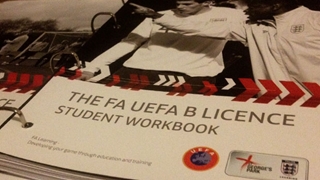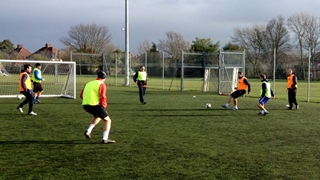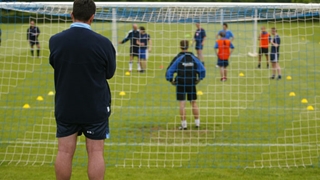
FA Editor Jamie Bradbury has taken his next steps along the coaching pathway and is now working towards the UEFA B coaching licence. Day one was his introduction to the course...
It was with excited anticipation that I left home on the first Monday of week one of the UEFA B course.
I gave myself plenty of time to get from Colchester to Docklands, taking the train as I normally would for work, but being wary of any delays that may hamper my progress.
Fortunately, unlike seven days earlier, the train journey to Stratford was fine, a short hop on the Jubilee Line and I was at North Greenwich - home of the O2 arena and the London Soccerdome.
I had forty minutes to spare, so popped for a coffee and with caffeine on board, I walked over to the Soccerdome heading straight into the classroom where I took the nearest seat. I was still early but there were many others gathered.
That moment arriving on courses is always a strange one. More often than not you know no one else, but look around for a familiar face. Having not played any football in the London area (apart from for The FA staff team) for the best part of eight years, I didn't know anyone.
That's not unusual, but what I've found on previous courses is that, among these complete strangers, you often find some good friends who you'll stay on contact with and see long after the programme is done and dusted.
For now, though, we sat and waited for things to get started. Jon Gittens was the first to say hello to the group, which was large by normal UEFA B standards. There were around 50 of us enrolled, and as course director Jon - a former professional with Swindon Town and Portsmouth - explained, it was due to the high number of applicants, so The FA had extended this particularly course.
It wasn't all on Jon, though, as he welcomed us and introduced the candidates to the three other tutors who would help us through the UEFA B; Ted Dale, Richard Carter and Colin Reid.
The first part of the day was what you might call 'administration'. The four tutors distributed the comprehensive course packs, which included a nice folder, literature, student workbooks, technical guidelines, a notepad and a copy of The Future Game.
Jon went on to talk about what we can expect from the course, and he was clear that this award would not just be handed out. It would require hard work, commitment and honesty across the 17 days. He also highlighted the need to be working at the appropriate level to be able to practice and carry out the UEFA B sessions required to complete the course.
It was with a smile that I learned that day ten - the goalkeepers syllabus - would be delivered by England Under-21s goalkeeping coach Martin Thomas. Having worked for seven years in the Under-21s camp, I know Thommo - formerly of Newcastle United and Bristol Rovers - very well. But that's in April.
So for now, Jon continued on about the important aspects of UEFA B and in particular the need to fully understand the different practice definitions, while the whole time I was scribbling down notes in my book.
Click here to read about the different practice definitions.
Ted then took over and gave us a background of the UEFA B course. Again, he re-iterated the importance of working with an eleven-a-side team to give ourselves the very best chance of qualifying.
And, although we were all targeting our assessment in September, in reality the UEFA B (and I'd suggest coaching in general) is a journey - you never stop learning and growing, even if you have 'badges' tucked away.
Ted explained that we have three years to complete the course, so if we fell short in our final assessment, we can still keep working and have another go down the line.
We were then split into four smaller tutor groups of 12 candidates, and Jon assigned himself to the group I was in. The other three tutors would each oversee a group.
Our next theory session was on coaching philosophy and what makes an effective coach. Every individual will have their own beliefs on how the game should be played, and back at your own clubs this will underpin how you coach your team.
Two coaches may be working on the very same topic and initially set out their sessions the same, but the outcomes will be different based on what each believes. There is no 'right' or 'wrong' way.
We could have gone on all day chatting, discussing and debating different philosophies, but we'd been in the classroom all morning and still had to address the principles of play before lunch.
This was led by Richard, and we spoke about probably the most important aspect of understanding the game; the attacking and defending principles.
Building on our Level 2 knowledge - create, maintain, exploit space; deny, delay, restrict space - Richard spoke in more depth about the principles and also highlighted the transitions between attacking and defending, and vice versa. (There would be a more in-depth talk about the principles on day three).
Ultimately, all sessions should work on these principles and we were to soon see some of them put into practice.
So, after some food, we headed out, or in, to the main dome which accommodates two full-size 3G pitches.
I'd been here before a few times for FA Staff Team games, and also played in a tournament in support of the England Footballers Foundation just before Christmas. With so many games being called off lately due to poor weather and pitches, I was envious of the dry and windless facilities. Give me a 3G pitch over a bobbly and sodden grass one any day.
Earlier in the morning we were given the course technical guidelines booklet, which carries all the practices that Jon, Ted, Richard, Colin and Martin would be demonstrating over the course of the next ten days.
And after a packed morning on theory, the afternoon was non-stop practical.
These are the practices we looked at (I've also created two of them on The FA Coach's App to download);
1 Principles of Attacking Play
Small-Sided Game 8v8
Richard demonstrated this practice, simulating as much so possible a realistic 11v11. He set each team up as 3-2-2 and after setting up allowed some free-play before starting to coach technical information around the attacking principles.
2 Passing and Control
Advanced Technical Practice - click to download pdf created with The FA Coach's App
Colin showed us this simple practice, slightly amending the version in our booklets, to have two groups of four situated on the pitch to simulate the positions in a real game. The session focused on passing, movement, angles and support and progressed into...
3 Passing and Control
Pattern Practice - click to download pdf created with The FA Coach's App
With two groups of four, Colin brought them together and introduced an opposing group of players, continuing to work on the same themes of passing, movement on and off the ball and support. It became a free-play practice that allowed Colin to create pictures of real scenarios and coach his group of players.
4 Passing and control on the move
Wave Practice
Ted took this practice, which included three teams and worked on retaining possession of the ball and highlighted some key points for passing practices; weight of pass, accuracy, body shape and support.
After the four practical sessions, we moved back into the classroom to wrap up. That's when I realised one of the benefits of having a large group, as I'd been able to just watch the sessions and wasn't needed to get involved - there were others who were far keener than me to run around all afternoon! I'm sure my time would come.
It had been a very tiring first day nonetheless, but really enjoyable to get back on another course.
I also picked up some really good advice that will remain in my thoughts: get to know all the technical points, learn about session definitions and formats, and make the principles of football second nature.
And it's with those at the forefront of my mind that I drifted off to sleep on the train home. Day one over, back tomorrow...
Check out TheFA.com over the coming days as Jamie continues on the UEFA B course.
If you have any questions you can follow Jamie on Twitter @jamiebradbury.











